A Study of Employee Motivation and the Impact of Job Experiences
VerifiedAdded on 2023/06/14
|8
|1978
|243
Essay
AI Summary
This essay delves into the multifaceted reasons why individuals engage in work, emphasizing the enhancement of living conditions, interpersonal interactions, personal growth, service, and job security. It highlights that people work for independence, financial stability, and social connections, enriching their lives while earning a livelihood. The study identifies key motivational factors, including financial rewards, personal satisfaction, quality of work life, recognition, organizational culture, job security, fair wages, and career development opportunities. It further examines the positive and negative aspects of employment that significantly shape employee experiences. Positive factors encompass rewards, supportive colleagues, positive working conditions, social relationships, interpersonal harmony, and performance appraisals. Conversely, negative factors include job stress, unfavorable company policies, poor pay, and the nature of the work itself. The essay concludes that a motivated and content workforce is crucial for achieving optimal performance standards and enhancing overall organizational efficiency, while addressing negative influences is essential for sustaining employee motivation and productivity. Desklib provides access to solved assignments and past papers for students.
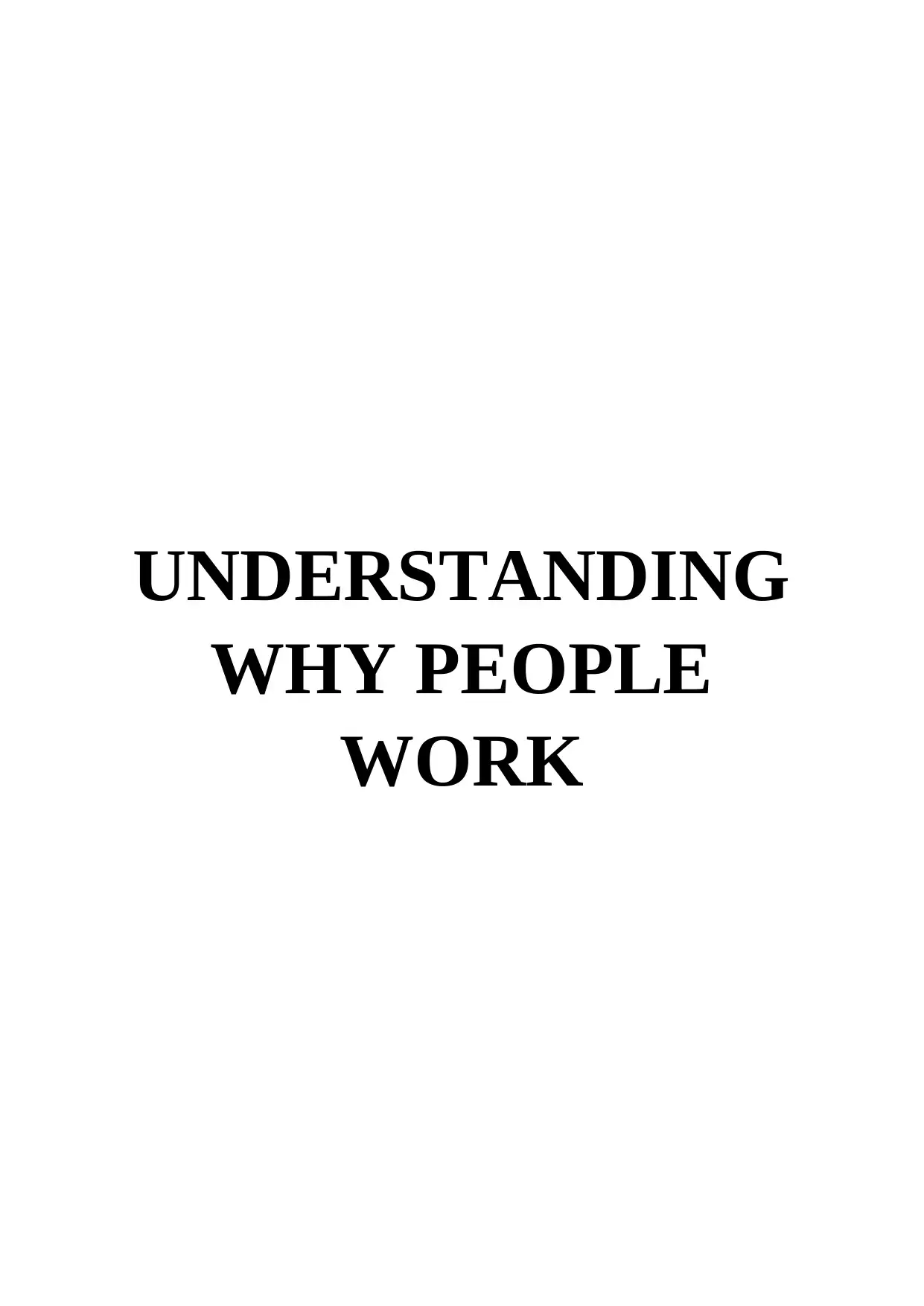
UNDERSTANDING
WHY PEOPLE
WORK
WHY PEOPLE
WORK
Paraphrase This Document
Need a fresh take? Get an instant paraphrase of this document with our AI Paraphraser
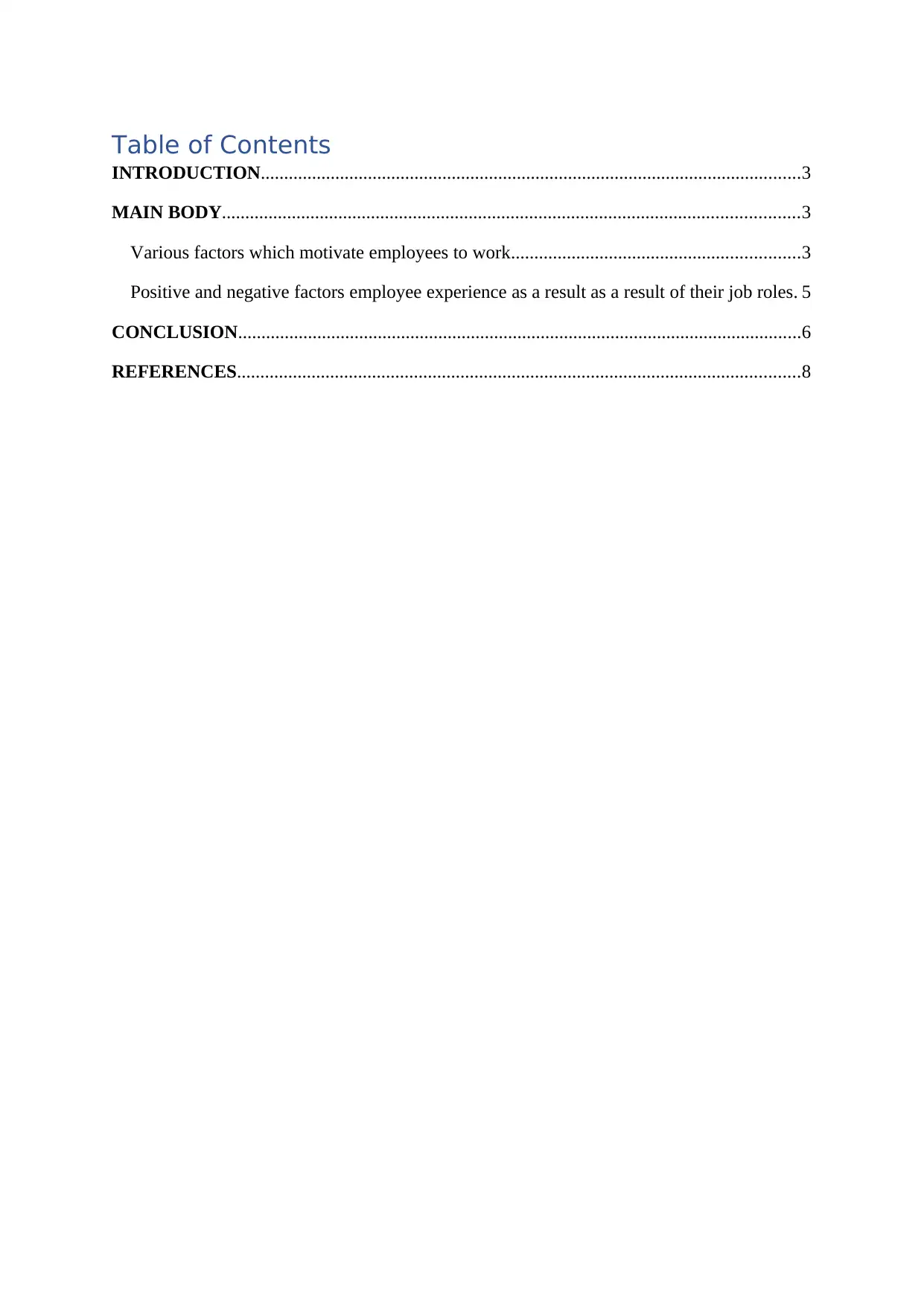
Table of Contents
INTRODUCTION....................................................................................................................3
MAIN BODY............................................................................................................................3
Various factors which motivate employees to work..............................................................3
Positive and negative factors employee experience as a result as a result of their job roles. 5
CONCLUSION.........................................................................................................................6
REFERENCES.........................................................................................................................8
INTRODUCTION....................................................................................................................3
MAIN BODY............................................................................................................................3
Various factors which motivate employees to work..............................................................3
Positive and negative factors employee experience as a result as a result of their job roles. 5
CONCLUSION.........................................................................................................................6
REFERENCES.........................................................................................................................8
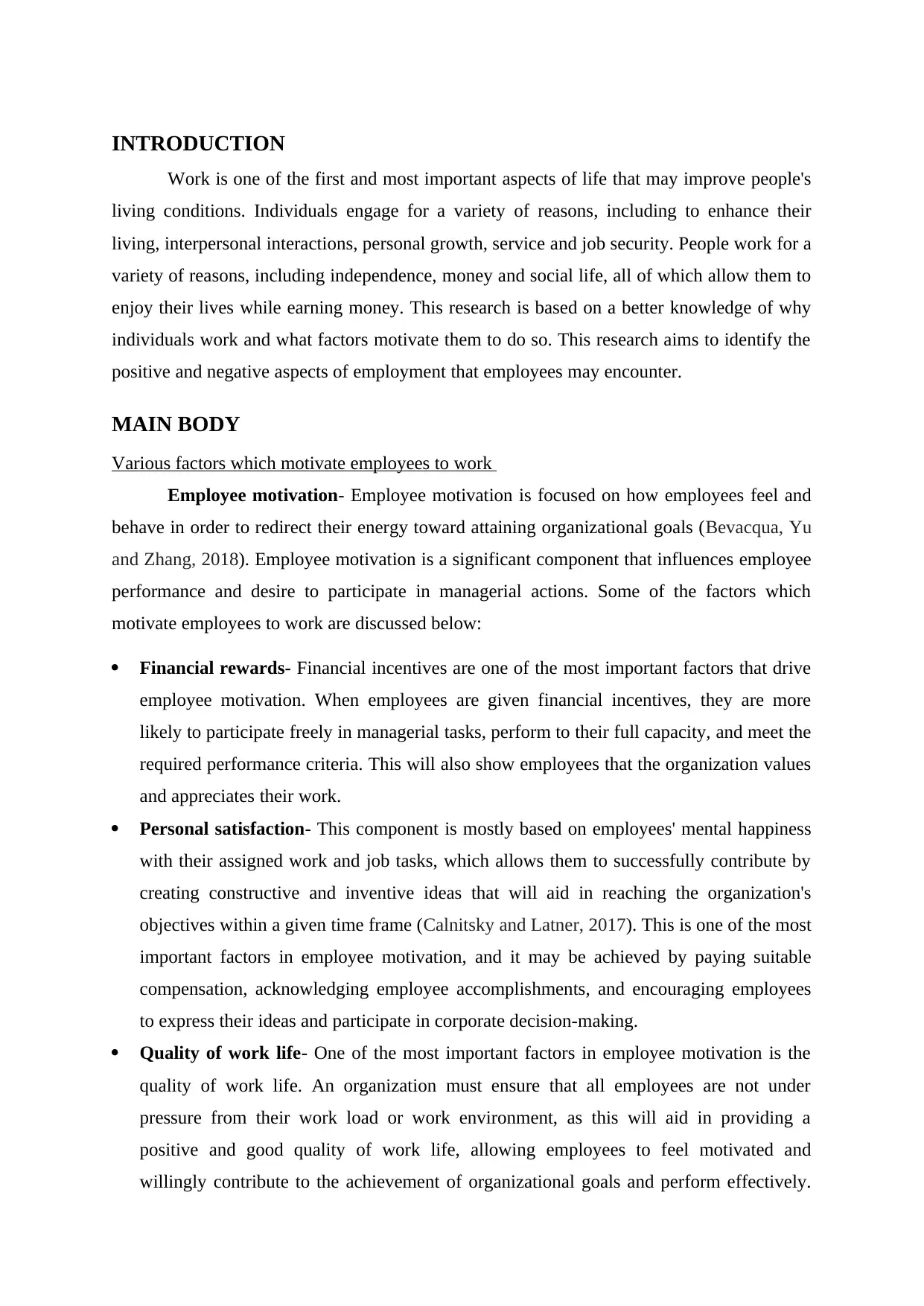
INTRODUCTION
Work is one of the first and most important aspects of life that may improve people's
living conditions. Individuals engage for a variety of reasons, including to enhance their
living, interpersonal interactions, personal growth, service and job security. People work for a
variety of reasons, including independence, money and social life, all of which allow them to
enjoy their lives while earning money. This research is based on a better knowledge of why
individuals work and what factors motivate them to do so. This research aims to identify the
positive and negative aspects of employment that employees may encounter.
MAIN BODY
Various factors which motivate employees to work
Employee motivation- Employee motivation is focused on how employees feel and
behave in order to redirect their energy toward attaining organizational goals (Bevacqua, Yu
and Zhang, 2018). Employee motivation is a significant component that influences employee
performance and desire to participate in managerial actions. Some of the factors which
motivate employees to work are discussed below:
Financial rewards- Financial incentives are one of the most important factors that drive
employee motivation. When employees are given financial incentives, they are more
likely to participate freely in managerial tasks, perform to their full capacity, and meet the
required performance criteria. This will also show employees that the organization values
and appreciates their work.
Personal satisfaction- This component is mostly based on employees' mental happiness
with their assigned work and job tasks, which allows them to successfully contribute by
creating constructive and inventive ideas that will aid in reaching the organization's
objectives within a given time frame (Calnitsky and Latner, 2017). This is one of the most
important factors in employee motivation, and it may be achieved by paying suitable
compensation, acknowledging employee accomplishments, and encouraging employees
to express their ideas and participate in corporate decision-making.
Quality of work life- One of the most important factors in employee motivation is the
quality of work life. An organization must ensure that all employees are not under
pressure from their work load or work environment, as this will aid in providing a
positive and good quality of work life, allowing employees to feel motivated and
willingly contribute to the achievement of organizational goals and perform effectively.
Work is one of the first and most important aspects of life that may improve people's
living conditions. Individuals engage for a variety of reasons, including to enhance their
living, interpersonal interactions, personal growth, service and job security. People work for a
variety of reasons, including independence, money and social life, all of which allow them to
enjoy their lives while earning money. This research is based on a better knowledge of why
individuals work and what factors motivate them to do so. This research aims to identify the
positive and negative aspects of employment that employees may encounter.
MAIN BODY
Various factors which motivate employees to work
Employee motivation- Employee motivation is focused on how employees feel and
behave in order to redirect their energy toward attaining organizational goals (Bevacqua, Yu
and Zhang, 2018). Employee motivation is a significant component that influences employee
performance and desire to participate in managerial actions. Some of the factors which
motivate employees to work are discussed below:
Financial rewards- Financial incentives are one of the most important factors that drive
employee motivation. When employees are given financial incentives, they are more
likely to participate freely in managerial tasks, perform to their full capacity, and meet the
required performance criteria. This will also show employees that the organization values
and appreciates their work.
Personal satisfaction- This component is mostly based on employees' mental happiness
with their assigned work and job tasks, which allows them to successfully contribute by
creating constructive and inventive ideas that will aid in reaching the organization's
objectives within a given time frame (Calnitsky and Latner, 2017). This is one of the most
important factors in employee motivation, and it may be achieved by paying suitable
compensation, acknowledging employee accomplishments, and encouraging employees
to express their ideas and participate in corporate decision-making.
Quality of work life- One of the most important factors in employee motivation is the
quality of work life. An organization must ensure that all employees are not under
pressure from their work load or work environment, as this will aid in providing a
positive and good quality of work life, allowing employees to feel motivated and
willingly contribute to the achievement of organizational goals and perform effectively.
⊘ This is a preview!⊘
Do you want full access?
Subscribe today to unlock all pages.

Trusted by 1+ million students worldwide
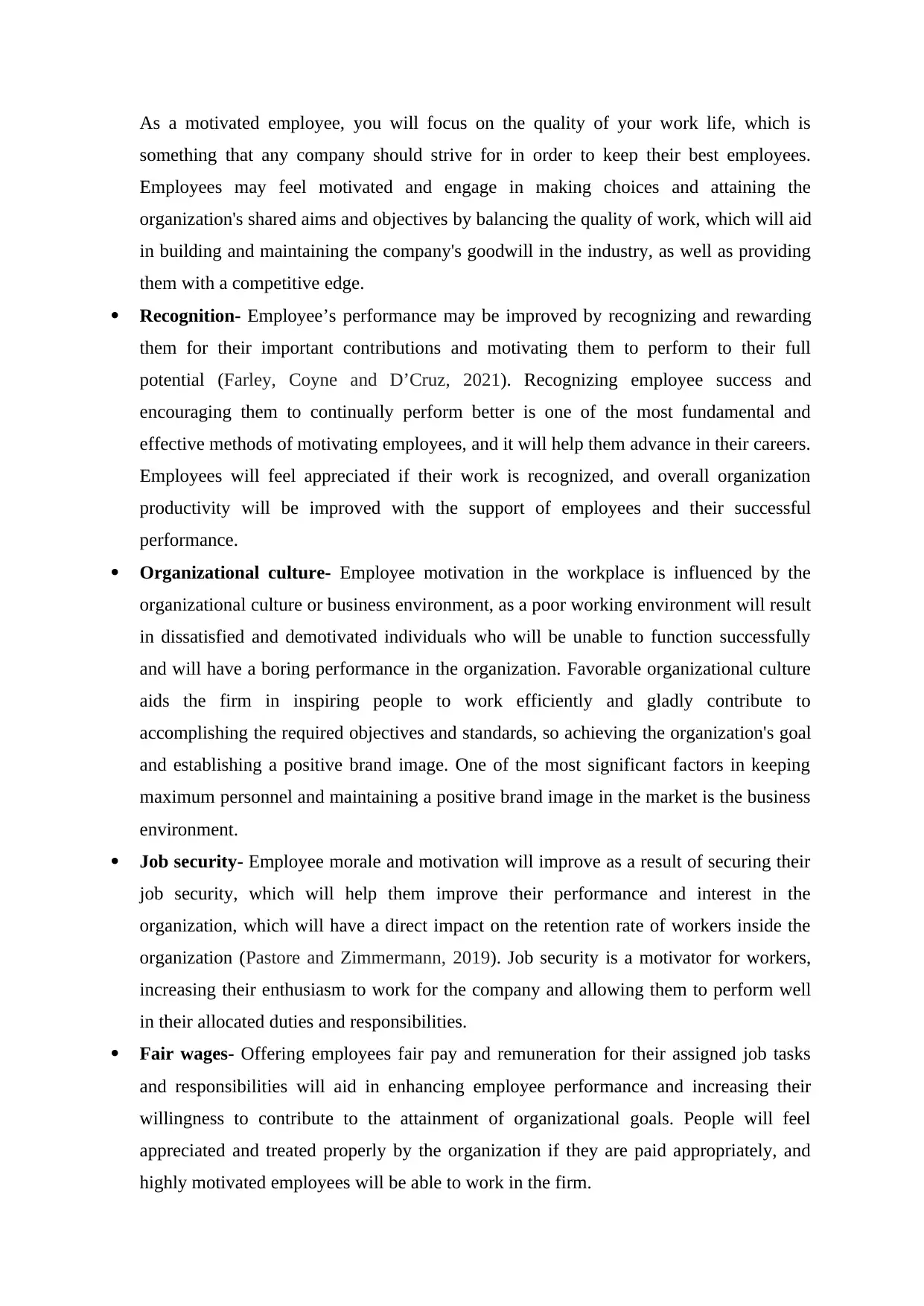
As a motivated employee, you will focus on the quality of your work life, which is
something that any company should strive for in order to keep their best employees.
Employees may feel motivated and engage in making choices and attaining the
organization's shared aims and objectives by balancing the quality of work, which will aid
in building and maintaining the company's goodwill in the industry, as well as providing
them with a competitive edge.
Recognition- Employee’s performance may be improved by recognizing and rewarding
them for their important contributions and motivating them to perform to their full
potential (Farley, Coyne and D’Cruz, 2021). Recognizing employee success and
encouraging them to continually perform better is one of the most fundamental and
effective methods of motivating employees, and it will help them advance in their careers.
Employees will feel appreciated if their work is recognized, and overall organization
productivity will be improved with the support of employees and their successful
performance.
Organizational culture- Employee motivation in the workplace is influenced by the
organizational culture or business environment, as a poor working environment will result
in dissatisfied and demotivated individuals who will be unable to function successfully
and will have a boring performance in the organization. Favorable organizational culture
aids the firm in inspiring people to work efficiently and gladly contribute to
accomplishing the required objectives and standards, so achieving the organization's goal
and establishing a positive brand image. One of the most significant factors in keeping
maximum personnel and maintaining a positive brand image in the market is the business
environment.
Job security- Employee morale and motivation will improve as a result of securing their
job security, which will help them improve their performance and interest in the
organization, which will have a direct impact on the retention rate of workers inside the
organization (Pastore and Zimmermann, 2019). Job security is a motivator for workers,
increasing their enthusiasm to work for the company and allowing them to perform well
in their allocated duties and responsibilities.
Fair wages- Offering employees fair pay and remuneration for their assigned job tasks
and responsibilities will aid in enhancing employee performance and increasing their
willingness to contribute to the attainment of organizational goals. People will feel
appreciated and treated properly by the organization if they are paid appropriately, and
highly motivated employees will be able to work in the firm.
something that any company should strive for in order to keep their best employees.
Employees may feel motivated and engage in making choices and attaining the
organization's shared aims and objectives by balancing the quality of work, which will aid
in building and maintaining the company's goodwill in the industry, as well as providing
them with a competitive edge.
Recognition- Employee’s performance may be improved by recognizing and rewarding
them for their important contributions and motivating them to perform to their full
potential (Farley, Coyne and D’Cruz, 2021). Recognizing employee success and
encouraging them to continually perform better is one of the most fundamental and
effective methods of motivating employees, and it will help them advance in their careers.
Employees will feel appreciated if their work is recognized, and overall organization
productivity will be improved with the support of employees and their successful
performance.
Organizational culture- Employee motivation in the workplace is influenced by the
organizational culture or business environment, as a poor working environment will result
in dissatisfied and demotivated individuals who will be unable to function successfully
and will have a boring performance in the organization. Favorable organizational culture
aids the firm in inspiring people to work efficiently and gladly contribute to
accomplishing the required objectives and standards, so achieving the organization's goal
and establishing a positive brand image. One of the most significant factors in keeping
maximum personnel and maintaining a positive brand image in the market is the business
environment.
Job security- Employee morale and motivation will improve as a result of securing their
job security, which will help them improve their performance and interest in the
organization, which will have a direct impact on the retention rate of workers inside the
organization (Pastore and Zimmermann, 2019). Job security is a motivator for workers,
increasing their enthusiasm to work for the company and allowing them to perform well
in their allocated duties and responsibilities.
Fair wages- Offering employees fair pay and remuneration for their assigned job tasks
and responsibilities will aid in enhancing employee performance and increasing their
willingness to contribute to the attainment of organizational goals. People will feel
appreciated and treated properly by the organization if they are paid appropriately, and
highly motivated employees will be able to work in the firm.
Paraphrase This Document
Need a fresh take? Get an instant paraphrase of this document with our AI Paraphraser
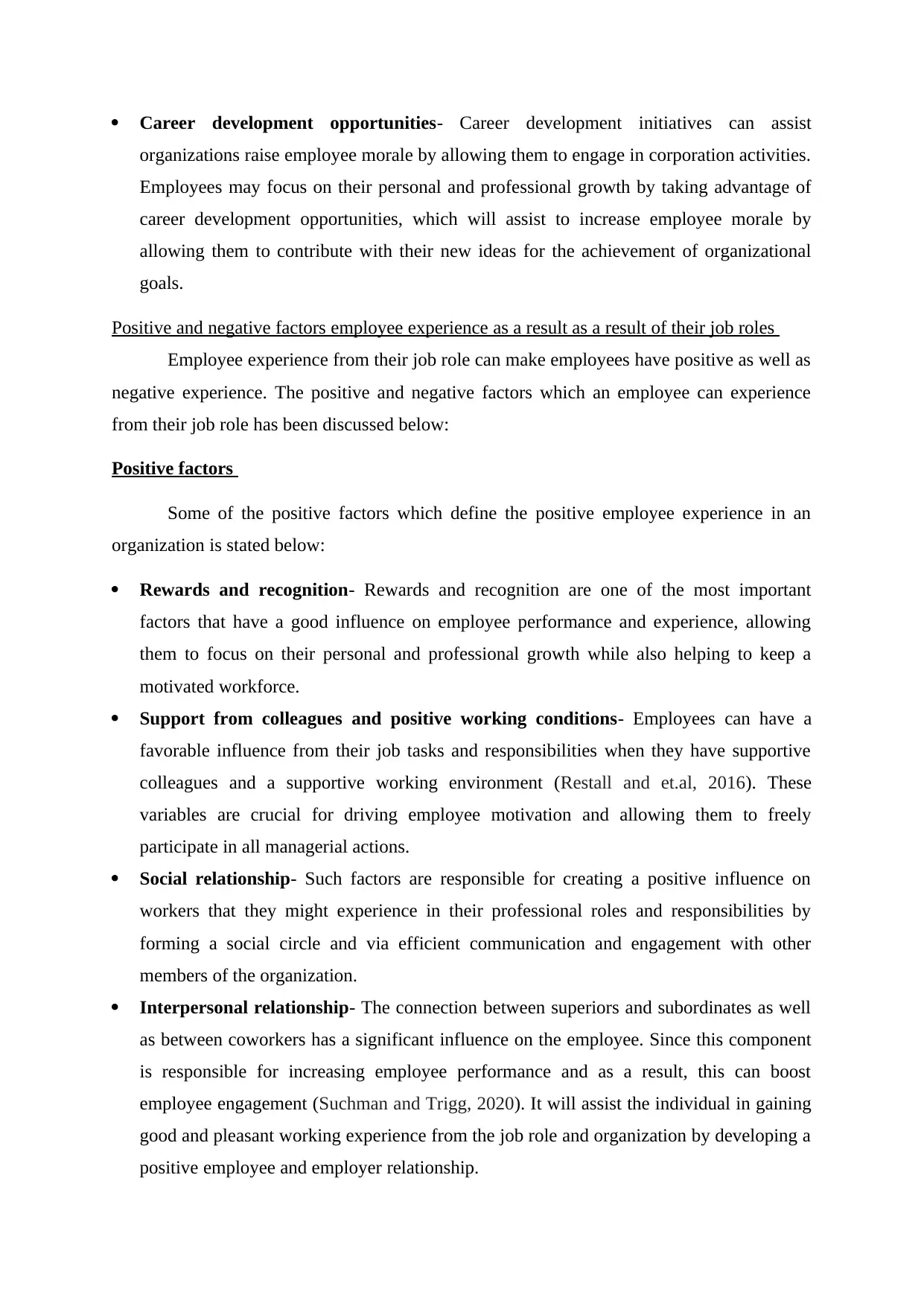
Career development opportunities- Career development initiatives can assist
organizations raise employee morale by allowing them to engage in corporation activities.
Employees may focus on their personal and professional growth by taking advantage of
career development opportunities, which will assist to increase employee morale by
allowing them to contribute with their new ideas for the achievement of organizational
goals.
Positive and negative factors employee experience as a result as a result of their job roles
Employee experience from their job role can make employees have positive as well as
negative experience. The positive and negative factors which an employee can experience
from their job role has been discussed below:
Positive factors
Some of the positive factors which define the positive employee experience in an
organization is stated below:
Rewards and recognition- Rewards and recognition are one of the most important
factors that have a good influence on employee performance and experience, allowing
them to focus on their personal and professional growth while also helping to keep a
motivated workforce.
Support from colleagues and positive working conditions- Employees can have a
favorable influence from their job tasks and responsibilities when they have supportive
colleagues and a supportive working environment (Restall and et.al, 2016). These
variables are crucial for driving employee motivation and allowing them to freely
participate in all managerial actions.
Social relationship- Such factors are responsible for creating a positive influence on
workers that they might experience in their professional roles and responsibilities by
forming a social circle and via efficient communication and engagement with other
members of the organization.
Interpersonal relationship- The connection between superiors and subordinates as well
as between coworkers has a significant influence on the employee. Since this component
is responsible for increasing employee performance and as a result, this can boost
employee engagement (Suchman and Trigg, 2020). It will assist the individual in gaining
good and pleasant working experience from the job role and organization by developing a
positive employee and employer relationship.
organizations raise employee morale by allowing them to engage in corporation activities.
Employees may focus on their personal and professional growth by taking advantage of
career development opportunities, which will assist to increase employee morale by
allowing them to contribute with their new ideas for the achievement of organizational
goals.
Positive and negative factors employee experience as a result as a result of their job roles
Employee experience from their job role can make employees have positive as well as
negative experience. The positive and negative factors which an employee can experience
from their job role has been discussed below:
Positive factors
Some of the positive factors which define the positive employee experience in an
organization is stated below:
Rewards and recognition- Rewards and recognition are one of the most important
factors that have a good influence on employee performance and experience, allowing
them to focus on their personal and professional growth while also helping to keep a
motivated workforce.
Support from colleagues and positive working conditions- Employees can have a
favorable influence from their job tasks and responsibilities when they have supportive
colleagues and a supportive working environment (Restall and et.al, 2016). These
variables are crucial for driving employee motivation and allowing them to freely
participate in all managerial actions.
Social relationship- Such factors are responsible for creating a positive influence on
workers that they might experience in their professional roles and responsibilities by
forming a social circle and via efficient communication and engagement with other
members of the organization.
Interpersonal relationship- The connection between superiors and subordinates as well
as between coworkers has a significant influence on the employee. Since this component
is responsible for increasing employee performance and as a result, this can boost
employee engagement (Suchman and Trigg, 2020). It will assist the individual in gaining
good and pleasant working experience from the job role and organization by developing a
positive employee and employer relationship.
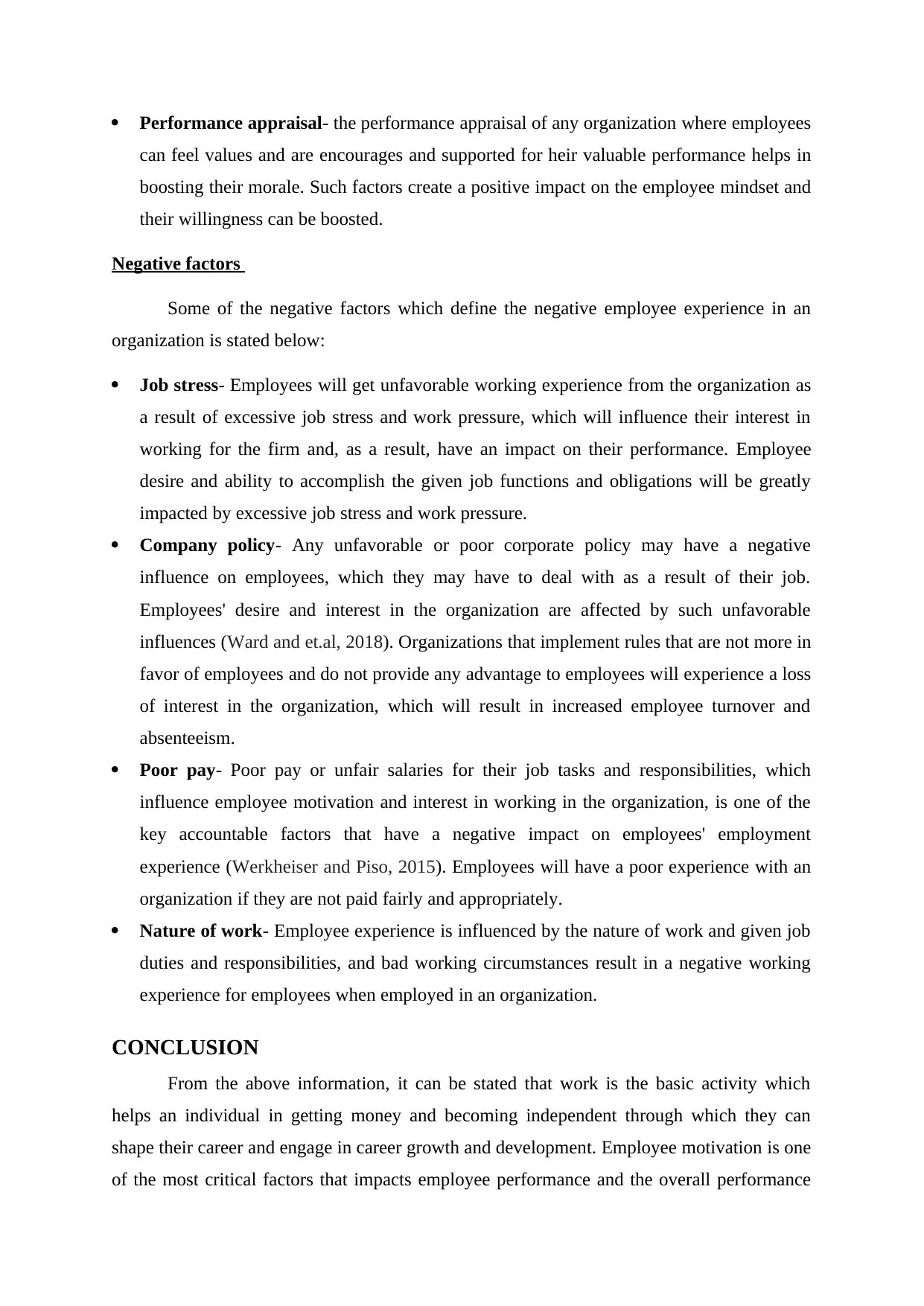
Performance appraisal- the performance appraisal of any organization where employees
can feel values and are encourages and supported for heir valuable performance helps in
boosting their morale. Such factors create a positive impact on the employee mindset and
their willingness can be boosted.
Negative factors
Some of the negative factors which define the negative employee experience in an
organization is stated below:
Job stress- Employees will get unfavorable working experience from the organization as
a result of excessive job stress and work pressure, which will influence their interest in
working for the firm and, as a result, have an impact on their performance. Employee
desire and ability to accomplish the given job functions and obligations will be greatly
impacted by excessive job stress and work pressure.
Company policy- Any unfavorable or poor corporate policy may have a negative
influence on employees, which they may have to deal with as a result of their job.
Employees' desire and interest in the organization are affected by such unfavorable
influences (Ward and et.al, 2018). Organizations that implement rules that are not more in
favor of employees and do not provide any advantage to employees will experience a loss
of interest in the organization, which will result in increased employee turnover and
absenteeism.
Poor pay- Poor pay or unfair salaries for their job tasks and responsibilities, which
influence employee motivation and interest in working in the organization, is one of the
key accountable factors that have a negative impact on employees' employment
experience (Werkheiser and Piso, 2015). Employees will have a poor experience with an
organization if they are not paid fairly and appropriately.
Nature of work- Employee experience is influenced by the nature of work and given job
duties and responsibilities, and bad working circumstances result in a negative working
experience for employees when employed in an organization.
CONCLUSION
From the above information, it can be stated that work is the basic activity which
helps an individual in getting money and becoming independent through which they can
shape their career and engage in career growth and development. Employee motivation is one
of the most critical factors that impacts employee performance and the overall performance
can feel values and are encourages and supported for heir valuable performance helps in
boosting their morale. Such factors create a positive impact on the employee mindset and
their willingness can be boosted.
Negative factors
Some of the negative factors which define the negative employee experience in an
organization is stated below:
Job stress- Employees will get unfavorable working experience from the organization as
a result of excessive job stress and work pressure, which will influence their interest in
working for the firm and, as a result, have an impact on their performance. Employee
desire and ability to accomplish the given job functions and obligations will be greatly
impacted by excessive job stress and work pressure.
Company policy- Any unfavorable or poor corporate policy may have a negative
influence on employees, which they may have to deal with as a result of their job.
Employees' desire and interest in the organization are affected by such unfavorable
influences (Ward and et.al, 2018). Organizations that implement rules that are not more in
favor of employees and do not provide any advantage to employees will experience a loss
of interest in the organization, which will result in increased employee turnover and
absenteeism.
Poor pay- Poor pay or unfair salaries for their job tasks and responsibilities, which
influence employee motivation and interest in working in the organization, is one of the
key accountable factors that have a negative impact on employees' employment
experience (Werkheiser and Piso, 2015). Employees will have a poor experience with an
organization if they are not paid fairly and appropriately.
Nature of work- Employee experience is influenced by the nature of work and given job
duties and responsibilities, and bad working circumstances result in a negative working
experience for employees when employed in an organization.
CONCLUSION
From the above information, it can be stated that work is the basic activity which
helps an individual in getting money and becoming independent through which they can
shape their career and engage in career growth and development. Employee motivation is one
of the most critical factors that impacts employee performance and the overall performance
⊘ This is a preview!⊘
Do you want full access?
Subscribe today to unlock all pages.

Trusted by 1+ million students worldwide
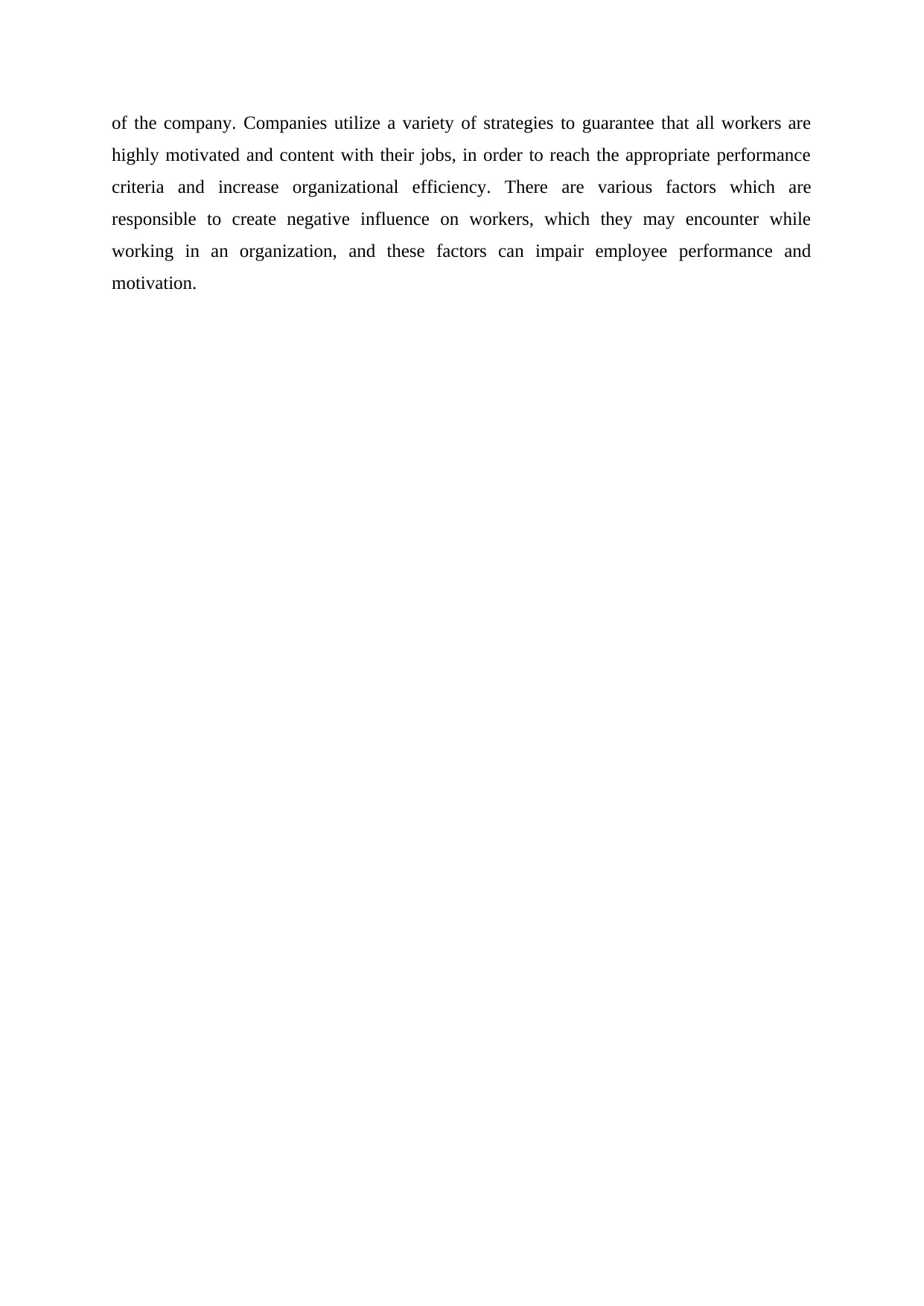
of the company. Companies utilize a variety of strategies to guarantee that all workers are
highly motivated and content with their jobs, in order to reach the appropriate performance
criteria and increase organizational efficiency. There are various factors which are
responsible to create negative influence on workers, which they may encounter while
working in an organization, and these factors can impair employee performance and
motivation.
highly motivated and content with their jobs, in order to reach the appropriate performance
criteria and increase organizational efficiency. There are various factors which are
responsible to create negative influence on workers, which they may encounter while
working in an organization, and these factors can impair employee performance and
motivation.
Paraphrase This Document
Need a fresh take? Get an instant paraphrase of this document with our AI Paraphraser
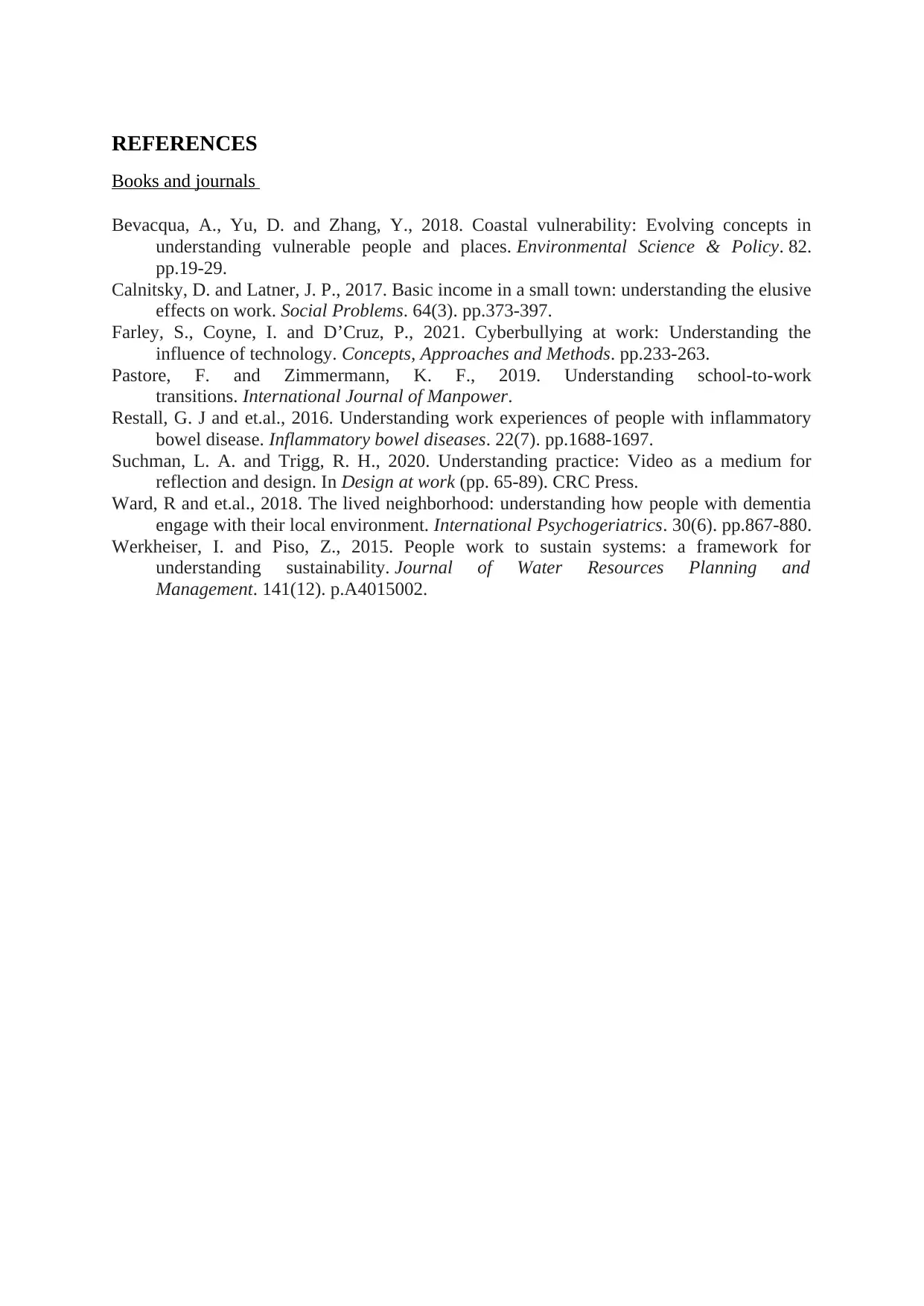
REFERENCES
Books and journals
Bevacqua, A., Yu, D. and Zhang, Y., 2018. Coastal vulnerability: Evolving concepts in
understanding vulnerable people and places. Environmental Science & Policy. 82.
pp.19-29.
Calnitsky, D. and Latner, J. P., 2017. Basic income in a small town: understanding the elusive
effects on work. Social Problems. 64(3). pp.373-397.
Farley, S., Coyne, I. and D’Cruz, P., 2021. Cyberbullying at work: Understanding the
influence of technology. Concepts, Approaches and Methods. pp.233-263.
Pastore, F. and Zimmermann, K. F., 2019. Understanding school-to-work
transitions. International Journal of Manpower.
Restall, G. J and et.al., 2016. Understanding work experiences of people with inflammatory
bowel disease. Inflammatory bowel diseases. 22(7). pp.1688-1697.
Suchman, L. A. and Trigg, R. H., 2020. Understanding practice: Video as a medium for
reflection and design. In Design at work (pp. 65-89). CRC Press.
Ward, R and et.al., 2018. The lived neighborhood: understanding how people with dementia
engage with their local environment. International Psychogeriatrics. 30(6). pp.867-880.
Werkheiser, I. and Piso, Z., 2015. People work to sustain systems: a framework for
understanding sustainability. Journal of Water Resources Planning and
Management. 141(12). p.A4015002.
Books and journals
Bevacqua, A., Yu, D. and Zhang, Y., 2018. Coastal vulnerability: Evolving concepts in
understanding vulnerable people and places. Environmental Science & Policy. 82.
pp.19-29.
Calnitsky, D. and Latner, J. P., 2017. Basic income in a small town: understanding the elusive
effects on work. Social Problems. 64(3). pp.373-397.
Farley, S., Coyne, I. and D’Cruz, P., 2021. Cyberbullying at work: Understanding the
influence of technology. Concepts, Approaches and Methods. pp.233-263.
Pastore, F. and Zimmermann, K. F., 2019. Understanding school-to-work
transitions. International Journal of Manpower.
Restall, G. J and et.al., 2016. Understanding work experiences of people with inflammatory
bowel disease. Inflammatory bowel diseases. 22(7). pp.1688-1697.
Suchman, L. A. and Trigg, R. H., 2020. Understanding practice: Video as a medium for
reflection and design. In Design at work (pp. 65-89). CRC Press.
Ward, R and et.al., 2018. The lived neighborhood: understanding how people with dementia
engage with their local environment. International Psychogeriatrics. 30(6). pp.867-880.
Werkheiser, I. and Piso, Z., 2015. People work to sustain systems: a framework for
understanding sustainability. Journal of Water Resources Planning and
Management. 141(12). p.A4015002.
1 out of 8
Related Documents
Your All-in-One AI-Powered Toolkit for Academic Success.
+13062052269
info@desklib.com
Available 24*7 on WhatsApp / Email
![[object Object]](/_next/static/media/star-bottom.7253800d.svg)
Unlock your academic potential
Copyright © 2020–2025 A2Z Services. All Rights Reserved. Developed and managed by ZUCOL.



